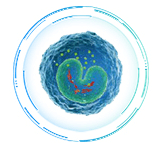Cell Proliferation and Cell Cycle
Cell proliferation refers to the process by which cells produce new cells through division, encompassing the four phases of the cell cycle: G1 (growth), S (DNA replication), G2 (preparation for division), and M (mitosis). Regulation of the cell cycle ensures that cells proliferate at the appropriate time, supporting the growth, repair, and development of organisms.
Studying cell proliferation and the cell cycle not only helps researchers understand the fundamental processes of life but also provides a theoretical foundation for disease treatment.
Elabscience® has meticulously developed a series of Cell Proliferation and Cell Cycle detection kits to support research in these areas.

Elabscience® Cell Proliferation and Cell Cycle Detection Kits
 CFSE Cell Division Tracker Kit
CFSE Cell Division Tracker Kit
Stable signal: Fluorescence can be retained in cells for weeks.
Safe and non-toxic: Low cytotoxicity, with minimal impact on cells
Simple operation: Staining takes only 0.5-1 h
 EdU Cell Proliferation Detection Kits
EdU Cell Proliferation Detection Kits
Simple to operate: no antibodies or DNA denaturation required
High sensitivity: accurately detects cell proliferation
Multiple options: Various fluorescence choices, compatible with flow cytometers and fluorescence microscopes
 Cell Cycle Detection Kits
Cell Cycle Detection Kits
Multiple options: Three fluorescence choices available, unaffected by autofluorescence
High accuracy: Precisely identifies cells at different stages
Wide applicability: Suitable for a variety of cell samples
Technical Resources

Technical Topics



